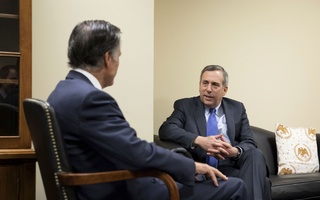{shortcode-d32fc0a0db98d02866e6be514a3d1ee41a143125}University President Lawrence S. Bacow recently met with a U.S. Treasury Department official as the government prepares final regulations for taxing university endowments, Bacow said in an interview last month.
Harvard’s endowment, valued at $39.2 billion, qualifies for taxation under the new tax codes Republican lawmakers passed last year. The University's endowment was previously exempt from taxes because the school is a non-profit entity.
The University’s financial report released in October estimates that the tax will cost Harvard $40 million to $50 million annually. Harvard will have to pay the endowment tax for the first time on returns from this fiscal year, which ends in June 2019.
The tax was passed nearly a year ago, but the University is still awaiting final guidance for how to file.
In an October interview, Bacow said he had recently met with an official from the Treasury Department, which is responsible for developing regulations for filing taxes.
“We don't know yet how the tax is actually going to be levied since the Treasury Department has not issued final regulations,” Bacow said. “I did meet recently with a representative of the Department of the Treasury to try and explain why certain regulations, and how they get interpreted, will be important to institutions like ours.”
The process of publishing final regulations around a law may take months or years, with plenty of feedback from those impacted, according to Harvard Law School Professor Thomas J. Brennan.
“Taxpayers will often try to provide feedback on how they think the law might best be crafted, and how it may best work,” Brennan said. “There’s a whole long process with lots of input from lots of private parties.”
He added that if regulations are not finalized by the time a tax goes into effect, taxpayers have to interpret the law “as best they can.”
Not only will Harvard have to learn how to file the tax, it may also change how the University invests. Bacow said future investment strategies will depend on how the tax is eventually implemented.
“We’ve not been tax-sensitive investors in the past. And the question is: do we need to become tax sensitive investors going forward?” he said.
Experts have said that university endowment managers may change investment strategies to reduce tax burden, including considering when to sell assets.
“It can affect both your choice of what to invest in, and also probably more importantly for Harvard, how often to sell,” Georgetown Law Professor Brian D. Galle ’94 said. “We only calculate the amount of taxable gain or loss on your investments in the year in which you sell or otherwise get rid of the property.”
“The timing can be very important, and it can keep you from switching into a better investment than the one you’ve got,” he added.
Bacow said it was still uncertain whether the University would be expected to pay taxes on unrealized returns — those from assets that have grown in value but have not been sold.
Galle said he understands the law — which levies a tax on the University’s net investment income — to only apply to realized returns, which result from assets being sold.
“You don’t include something in income unless it's been sold or otherwise disposed of,” Galle said.
The Internal Revenue Service released draft guidance on the endowment tax in August, indicating that universities will not be taxed on an asset’s gain in value that occured before 2018.
The IRS also released draft guidance on other changes from the tax overhaul that affect universities, including the executive compensation tax levied on the amount of a salary that exceeds $1 million and changes to how Unrelated Business Income Tax is calculated.
Brennan said that IRS regulations fill in ambiguities in tax laws.
“Every law, no matter how well it’s written, is going to have some non-specificity, some grey area, some lack of detail that can be filled in, and that’s the job of the regulations,” Brennan said. “The substantive content of the regulations should be determined by the professionals at Treasury in light of how they read the law.”
—Staff writer Eli W. Burnes can be reached at eli.burnes@thecrimson.com.
—Staff writer Andrew J. Zucker can be reached at andrew.zucker@thecrimson. com. Follow him on Twitter @AndrewJZucker.
Read more in News
IOP Elects First All-Female Executive Board in More than a DecadeRecommended Articles
-
The Man For The Moment?
-
 With Endowment Tax on the Horizon, Harvard Still Doesn’t Know How to File Its Returns
With Endowment Tax on the Horizon, Harvard Still Doesn’t Know How to File Its Returns -
 What’s At Stake for Harvard in the Midterm Elections
What’s At Stake for Harvard in the Midterm Elections -
 A Mass. Democrat’s Ascent in Congress May Not Bring the Endowment Tax Repeal Harvard is Hoping For
A Mass. Democrat’s Ascent in Congress May Not Bring the Endowment Tax Repeal Harvard is Hoping For -
 Bacow Maintains Long-Standing Lobbying Priorities During Return to D.C.
Bacow Maintains Long-Standing Lobbying Priorities During Return to D.C.













